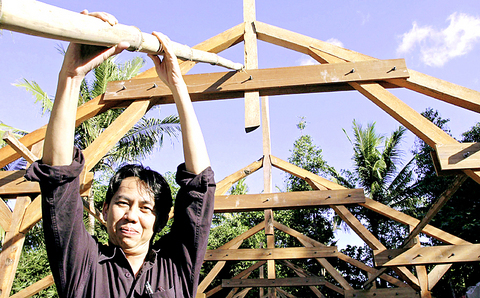Many Indonesians would have survived a deadly earthquake last month if houses had been built out of bamboo and other flexible materials, says an architect on a mission to transform devastated villages.
Eko Prawoto, who is working with homeless survivors in Ngipikan, a village in an area hard-hit by the quake that rocked Central Java and Yogyakarta, blames poor construction techniques for the huge loss of life and injuries.
"Many people who died in this earthquake died because of the brick walls that fell on them," he said.

PHOTO: AFP
The 6.3-magnitude temblor killed 5,800 people, injured up to 40,000 people and destroyed or damaged almost 600,000 houses in the heavily-populated area, which like much of Indonesia faces a constant risk of serious earthquakes.
Many of the houses that were damaged or flattened were built of brick and concrete and featured little reinforcement to resist the shockwaves of the quake, Prawoto says.
A preliminary assessment by the government's Development Planning Agency (Bappenas) also blamed poor construction for the high injury and death toll.
A bookshop and some houses in Yogyakarta built after Prawoto's mostly timber designs survived the May 27 quake undamaged, were his first experiments in quake-resistant construction.
"It's a wooden structure -- which is elastic -- and absorbs shocks ... During an earthquake, you have pushing and pulling forces. Each junction should resist these kind of forces," he said.
In Java, as in much of Indonesia, residences made of bamboo and timber are generally looked down upon as poor people's housing, whereas concrete and brick are viewed as symbols of modernity and rising wealth, Prawoto said.
Nevertheless in the aftermath of the quake, many traumatized villagers now fear living or even sitting inside brick or concrete buildings.
"It's a traumatic experience for them," he said.
For Ngipikan, where almost all the houses were destroyed, Prawoto has designed houses for rebuilding that use traditional materials but have a modern twist: The lower half of the house walls are brick and the upper half bamboo, with coconut trees used for the structural posts.
"It's important to apply bamboo and timber in a different way so as to give the image of newness," he said.
"We use brick but only 1m high -- so in case an earthquake happens again, if it falls down then it's not so dangerous," he said.
Assisted by donations from the local daily Kompas, Prawoto has begun building four of a planned 65 houses. He hopes the houses will serve as a model for other residents looking to build cheap but strong new homes.
With free labor provided by villagers and using recycled timber from the collapsed houses in combination with low-cost bamboo, he estimates each house will cost 10 million rupiah (US$1,060).
The government has promised to pay 30 million rupiah to quake victims whose houses were destroyed, but Prawoto suspects such assistance will take months to be disbursed and people cannot wait that long.

Yemen’s separatist leader has vowed to keep working for an independent state in the country’s south, in his first social media post since he disappeared earlier this month after his group briefly seized swathes of territory. Aidarous al-Zubaidi’s United Arab Emirates (UAE)-backed Southern Transitional Council (STC) forces last month captured two Yemeni provinces in an offensive that was rolled back by Saudi strikes and Riyadh’s allied forces on the ground. Al-Zubaidi then disappeared after he failed to board a flight to Riyadh for talks earlier this month, with Saudi Arabia accusing him of fleeing to Abu Dhabi, while supporters insisted he was

‘SHOCK TACTIC’: The dismissal of Yang mirrors past cases such as Jang Song-thaek, Kim’s uncle, who was executed after being accused of plotting to overthrow his nephew North Korean leader Kim Jong-un has fired his vice premier, compared him to a goat and railed against “incompetent” officials, state media reported yesterday, in a rare and very public broadside against apparatchiks at the opening of a critical factory. Vice Premier Yang Sung-ho was sacked “on the spot,” the state-run Korean Central News Agency said, in a speech in which Kim attacked “irresponsible, rude and incompetent leading officials.” “Please, comrade vice premier, resign by yourself when you can do it on your own before it is too late,” Kim reportedly said. “He is ineligible for an important duty. Put simply, it was

The Chinese Embassy in Manila yesterday said it has filed a diplomatic protest against a Philippine Coast Guard spokesman over a social media post that included cartoonish images of Chinese President Xi Jinping (習近平). Philippine Coast Guard spokesman Jay Tarriela and an embassy official had been trading barbs since last week over issues concerning the disputed South China Sea. The crucial waterway, which Beijing claims historic rights to despite an international ruling that its assertion has no legal basis, has been the site of repeated clashes between Chinese and Philippine vessels. Tarriela’s Facebook post on Wednesday included a photo of him giving a

Syrian President Ahmed al-Sharaa on Sunday announced a deal with the chief of Kurdish-led forces that includes a ceasefire, after government troops advanced across Kurdish-held areas of the country’s north and east. Syrian Kurdish leader Mazloum Abdi said he had agreed to the deal to avoid a broader war. He made the decision after deadly clashes in the Syrian city of Raqa on Sunday between Kurdish-led forces and local fighters loyal to Damascus, and fighting this month between the Kurds and government forces. The agreement would also see the Kurdish administration and forces integrate into the state after months of stalled negotiations on